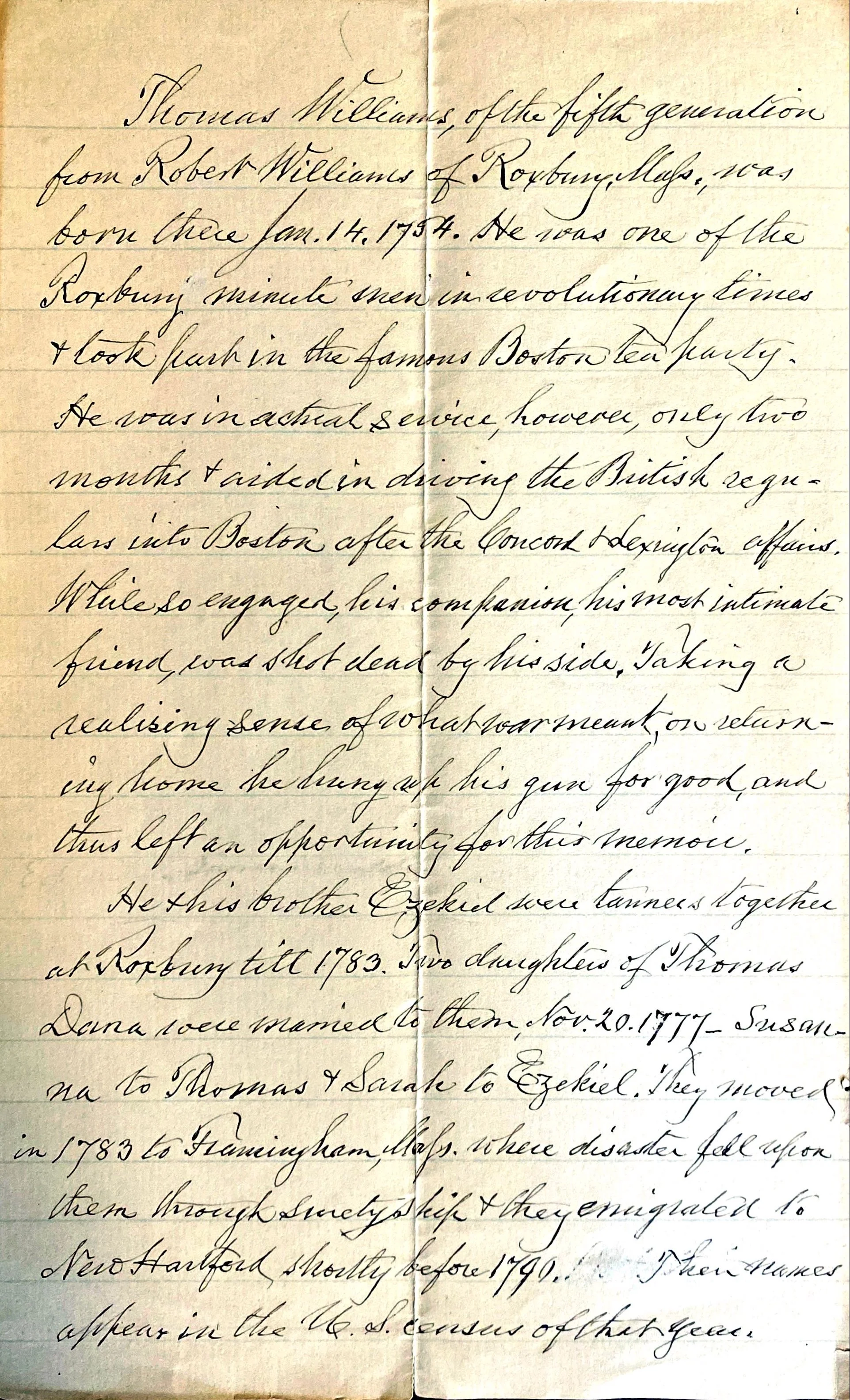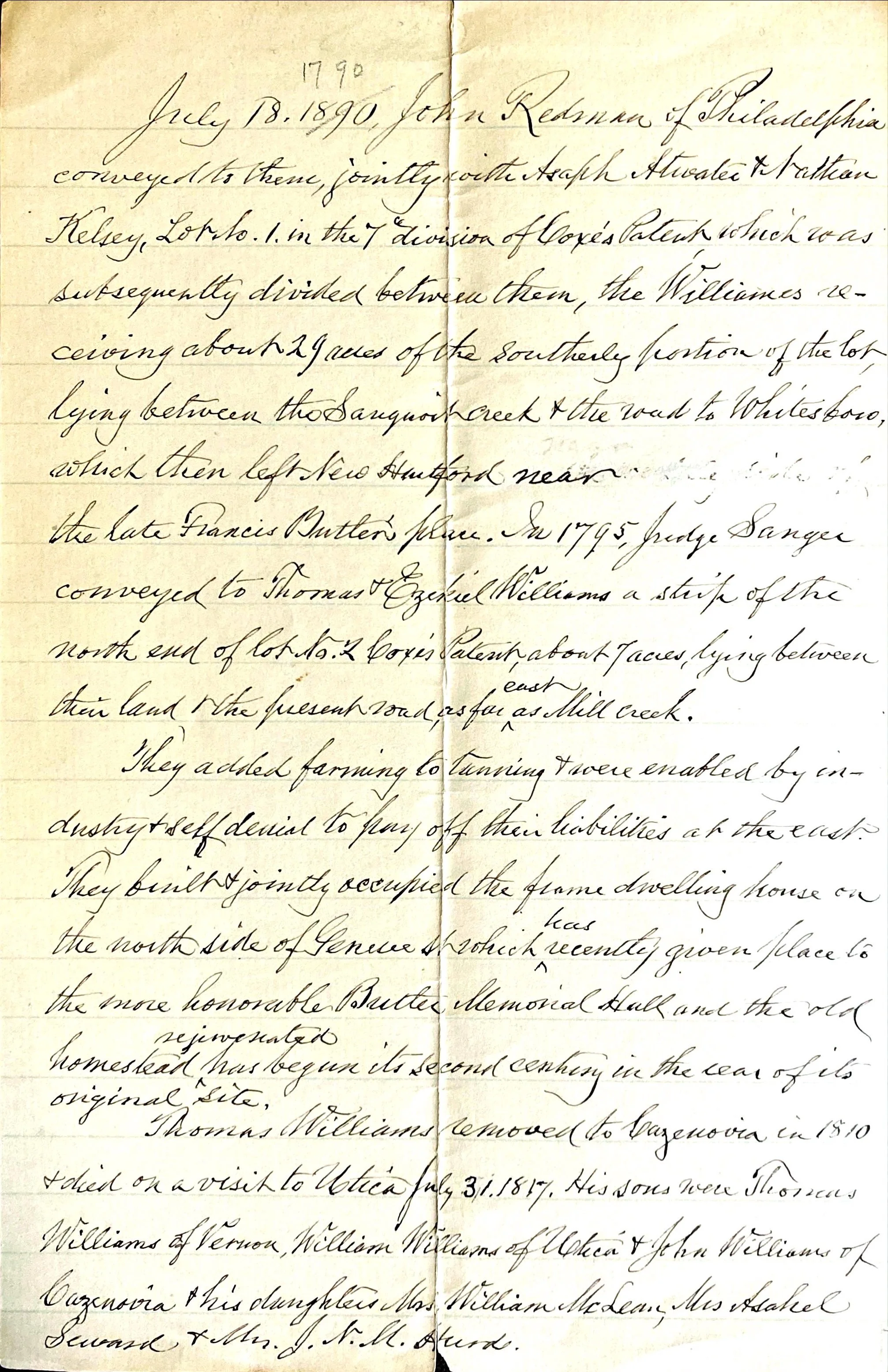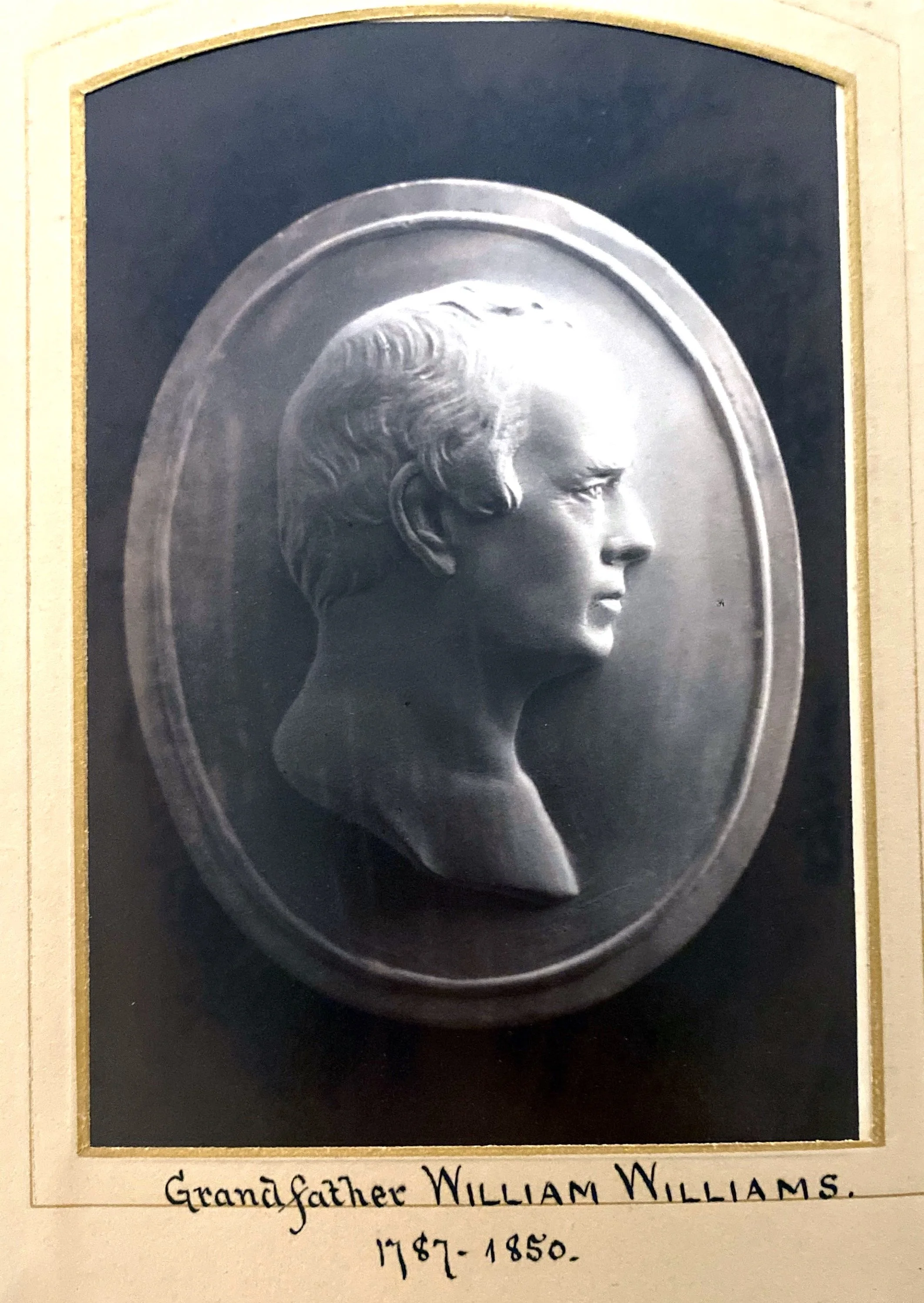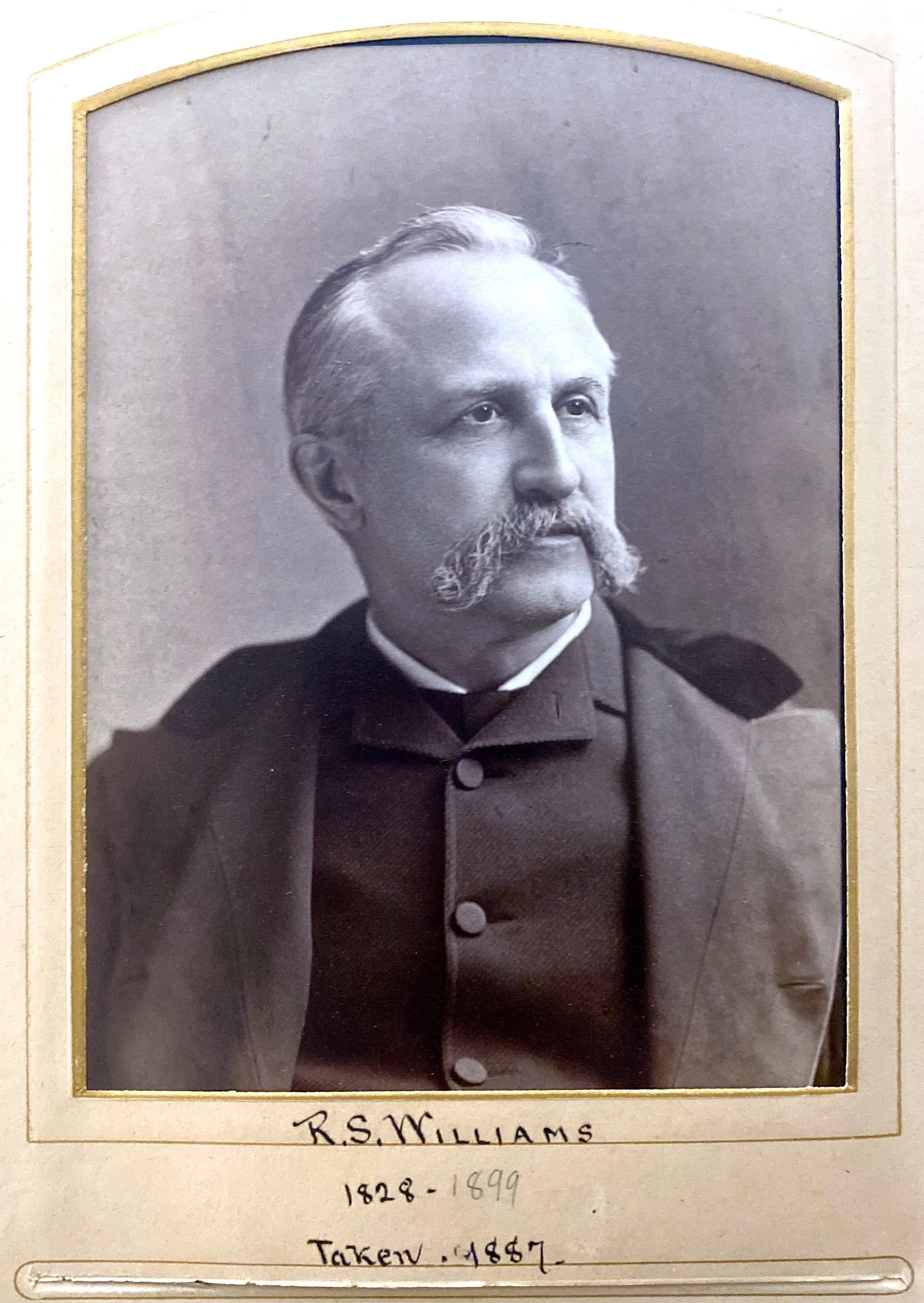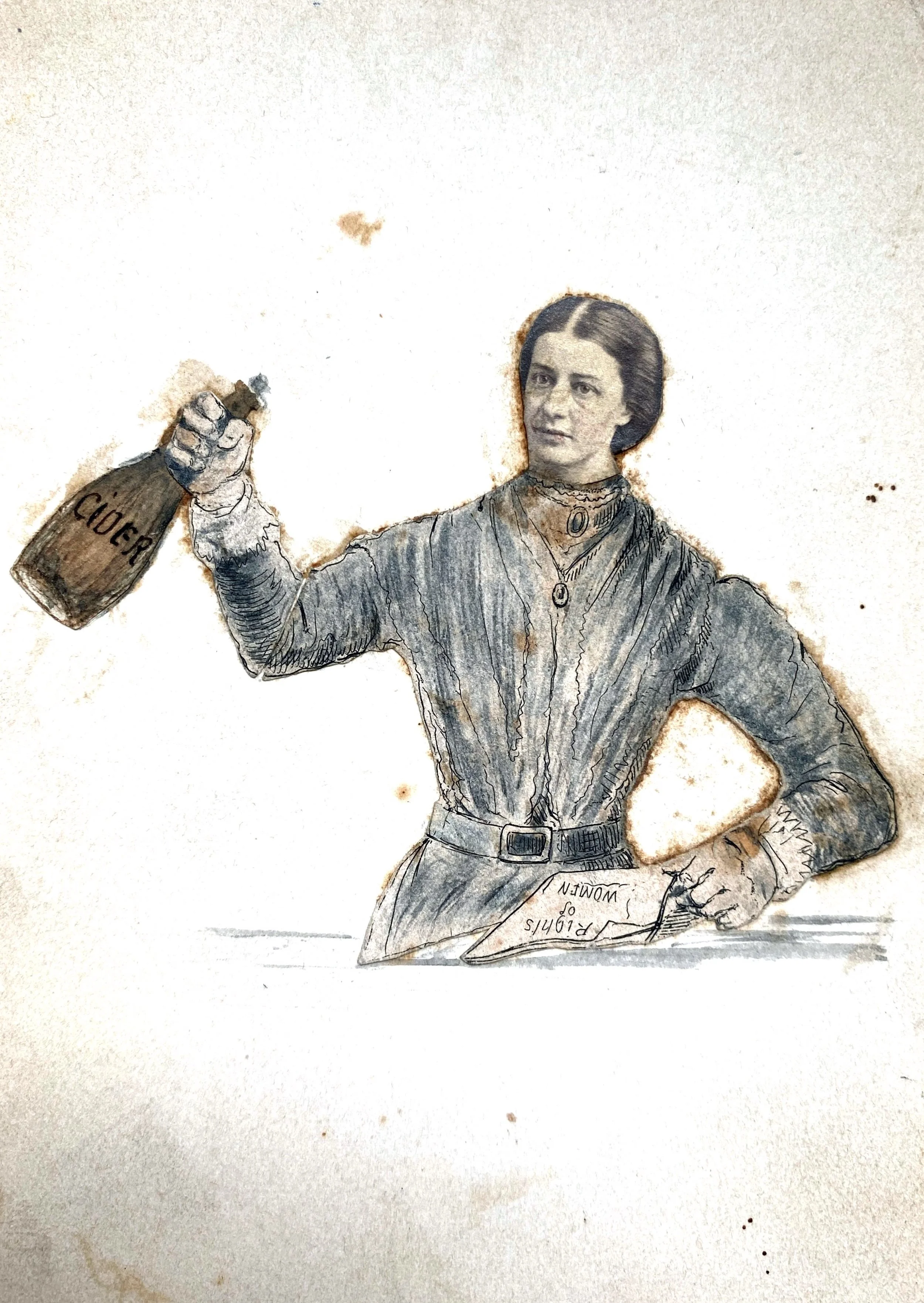Williams Family
-
Robert Williams
(great-great-great-great-great-great-great-great-great grandfather)
B. 1608
(Great Yarmouth Borough, Norfolk, England)
D. 1693
(Roxbury, Suffolk County, Massachusetts)
Spouse
1st: Elizabeth Stalham Williams (1597-1674 m. 1628)
2nd: Margaret Hawkes Williams (1617-1690 m. 1675)
Children
Elizabeth Williams Cutter (1620-1662)
Deborah Williams Turner (1628-1676)
Samuel Williams (1632-1698)
John Williams (1635-1658)
Isaac Williams (1638-1708)
Stephen Williams (1640-1720)
-
Elizabeth Stalham Williams
(great-great-great-great-great-great-great-great-great grandmother)
B.
D.
Parents
Siblings
Spouse
1st: Robert Williams (1608-1693 m. 1628)
Children
Elizabeth Williams Cutter (1620-1662)
Deborah Williams Turner (1628-1676)
Samuel Williams (1632-1698)
John Williams (1635-1658)
Isaac Williams (1638-1708)
Stephen Williams (1640-1720)
-
Capt Stephen Williams
(great-great-great-great-great-great-great-great grandfather)
B. 1640
(Roxbury, Suffolk County, Massachusetts)
D. 1720
(Roxbury, Suffolk County, Massachusetts)
Parents
Robert Williams (1608-1693)
Elizabeth Stalham Williams (1597-1674)
Siblings
Elizabeth Williams Cutter (1620-1662)
Deborah Williams Turner (1628-1676)
Samuel Williams (1632-1698)
John Williams (1635-1658)
Isaac Williams (1638-1708)
Stephen Williams (1640-1720)
Spouse
Sarah Wise Williams (1647-1728 m. 1666)
Children
Sarah Williams Phipps (1667-1707)
Mary Williams Choate Story (1669-unknown)
Elizabeth Williams Tucker (1672-1740)
Stephen Williams (1678-1768)
Joseph Williams (1681-1720)
John Williams (1681-1720)
-
Sarah Wise Williams
(great-great-great-great-great-great-great-great grandmother)
B. 1647
(Roxbury, Suffolk County, Massachusetts)
D. 1728
(Roxbury, Suffolk County, Massachusetts)
Parents
Joseph Wise (1617-1684)
Mary Thompson Wise (1619-1693)
Siblings
Bethiah Wise Scarbourough (unknown-1728)
John Wise (1652-1725)
Katherine Wise Mather (1658-1686)
Spouse
Stephen Williams (1640-1720 m. 1666)
Children
Sarah Williams Phipps (1667-1707)
Mary Williams Choate Story (1669-unknown)
Elizabeth Williams Tucker (1672-1740)
Stephen Williams (1678-1768)
Joseph Williams (1681-1720)
John Williams (1681-1720)
-
John Williams
(great-great-great-great-great-great-great grandfather)
B. 1683
(Roxbury, Suffolk County, Massachusetts)
D. 1734
(Roxbury, Suffolk County, Massachusetts - age: 51)
Parents
Capt. Stephen Williams (1640-1720)
Sarah Wise Williams (1647-1728)
Siblings
Sarah Williams Phipps (1667-1707)
Mary Williams Choate Story (1669-unknown)
Elizabeth Williams Tucker (1672-1740)
Stephen Williams (1678-1768)
Joseph Williams (1681-1720)
John Williams (1681-1720) Half-Sibling!!
Spouse
Dorothy Brewer Williams (1697-1728 m. 1715)
Children
John Williams (1719-1794)
Margaret Williams Griggs (1723-1800)
Lucy Williams Standart (1772-1854)
Profession
Tanner
-
Dorothy Brewer Williams
(great-great-great-great-great-great-great grandmother)
B. 1697
(Roxbury, Suffolk County, Massachusetts)
D. 1728
(Roxbury, Suffolk County, Massachusetts - age: 31)
Parents:
Siblings:
Spouse:
John Williams (1683-1734 m. 1715)
Children:
John Williams (1719-1794)
Margaret Williams Griggs (1723-1800)
Profession:
Education:
-
John Williams
(great-great-great-great-great-great grandfather)
B. 1719 (Massachusetts)
D. 1794
(Massachusetts - age: 74)
Parents
John Williams (1684-1742)
Dorothy Brewer Williams (1697-1728)
Siblings: Margaret Williams Griggs (1723-1800)
Spouse
1st: Ann Bird Williams (1724-1767 m. 1749)
2nd: Rebecca Winslow Williams (1742-1788 m. 1743)
Children
Thomas Williams (1754-1817)
Ezekial Williams (1755-1849)
Lucy Williams Standart (1772-1854)
Profession: Tanner
Education
-
Ann Bird Williams
(great-great-great-great-great-great grandmother)
B. August 1724
(Massachusetts)
D. April 1767
(Massachusetts - Age: 42)
Parents
Thomas Bird (1693-1770)
Mary Clap Bird (1699-1761)
Siblings: 5
Spouse
John Williams (1719-1794 m.1749)
Children
Thomas Williams (1754-1817)
Ezekial Williams (1755-1849)
-
(great-great-great-great-great grandfather)
B. January 1754
(Massachusetts)
D. July 1817
(NY - Age: 63)
Parents
John Williams (1719-1794)
Ann Bird Williams (1724-1841)
Siblings
Ezekiel Williams (1755-1849)
Half Sibling
Lucy Williams Standart (1772-1854)
Spouse
Susanna Dana Williams (1754-1841 m. 1777)
Children
William Williams (1787-1850)
Profession
Participant in the Boston Tea Party
Tannery
Education
-
Ezekiel Williams, Sr
B. October 1755 (Massachusetts)
D. August 1849 (New Hartford, NY - Age:93)
Parents
John Williams (1719-1794)
Anna Bird Williams (1724-1767)
Siblings
Thomas Williams (1754-1817)
Half Sibling
Lucy Williams Standart (1772-1854)
Spouse: Sarah Dana Williams (1756-1813 m. 1777)
Children
Ezekiel Williams (1782-1856)
Nancy Williams Sherrill (1784-1822)
Mary Williams Bushnell (1787-1877)
Profession
Participant in the Boston Tea Party
Tanner
Education
-
Susanna Dana Williams
(great-great-great-great-great grandmother)
B. July 1754 (Massachusetts)
D. February 1841 (Oneida County, NY - Age: 86)
Parents
Thomas Dana (1723-1817)
Martha Williams Dana (1728-1795)
Siblings
Thomas Dana (1753-1787)
Sarah Dana Williams (1756-1813)
Spouse
Thomas Williams (1754-1817 (m.1777)
Children
William Williams
-
William Williams
B. 1787 (Massachusetts)
D. 1850 (Utica - Age: 62)
Parents
Thomas Williams (1754-1817)
Susanna Dana Williams (1754-1841)
Siblings: Sukey & Martha
Spouse:
1st: Sophia Wells Williams (1791-1831 m. 1811)
2nd: Catherine Huntington Williams (1797-1856 m. 1833)
Children
Samuel Wells Williams (1812-1884)
Frederic Williams (1813-1814)
Henry Dwight Williams (1815-1895)
Harriet Wells Williams (1816-1824)
William Frederick Williams (1818-1871)
Laura Williams (1819-1820)
Edward Seward Williams (1821-1865)
Sophia Wells Williams Garnder (1821-1903)
Julian Williams (1823-1824)
James Carnahan Williams (1824-1852)
John Porter Williams (1826-1857)
Robert Stanton Williams (1828-1899)
Alfred Pell Williams (1830-1831)
Thomas Williams (1831-1831)
Henry Huntington Williams (1844-1835)
George Huntington Williams (1837-1855)
Profession
Master printer & journalist
Served in the war of 1812
Bookstore
Education
-
Sophia Wells Williams
(great-great-great-great grandmother)
B. April 1791 (Whitestown, NY)
D. November 1831 (Utica - Age: 40)
Parents
Samuel Wells (1763-1803)
Dorothy Prentice Wells (1765-1852)
Siblings
James Wells (1792-1873)
Harriet Wells (1796-1814)
Spouse: William Williams (1787-1850 m. 1811)
Children
Samuel Wells Williams (1812-1884)
Frederic Williams (1813-1814)
Henry Dwight Williams (1815-1895)
Harriet Wells Williams (1816-1824)
William Frederick Williams (1818-1871)
Laura Williams (1819-1820)
Edward Seward Williams (1821-1865)
Sophia Wells Williams Garnder (1821-1903)
Julian Williams (1823-1824)
James Carnahan Williams (1824-1852)
John Porter Williams (1826-1857)
Robert Stanton Williams (1828-1899)
Alfred Pell Williams (1830-1831)
Thomas Williams (1831-1831)
-
Samuel Wells Williams
(great-great-great-great-great uncle)
B.
D.
Parents
William Williams
Sophia Wells Williams
Siblings
Spouse
Children
Profession
Education
Williams was born in Utica, New York, son of publisher William Williams and wife Sophia, an elder of the First Presbyterian Church. At age 8 he was impressed by the departure to Ceylon as a printing missionary of a James Garrett who was associated with his father's printing business. He studied at Rensselaer Polytechnic Institute in Troy, New York. There he assisted in the writing of a botanical manual by Senior Professor and co-founder Amos Eaton, published 1833.[1]:504–5 On graduation he was elected as a professor of the institute.
-
(great-great-great grandfather)
B. September 1828 (Utica, NY)
D. August 1899 (Utica, NY - Age: 70)
Parents
William Williams
Sophia Wells Williams (d. 1831)
Siblings
Samuel Wells Williams
Frederic Williams
Henry Dwight Williams
Harriet Wells Williams
William Frederick Williams
Laura Williams
Edward Seward Williams
Sophia Wells Williams Gardner
Julian Williams
James Carnahan Williams
John Porter Williams
Alfred Pell Williams
Thomas Williams
Half Siblings:
Henry Huntington Williams (died at 1)
George Huntington Williams (died at 18)
Spouse: Abigail Obear Doolittle Williams (1830-1908)
Children
George Huntington Williams (1856-1894)
Cornelia d’Auby Williams (1858-1921)
John Camp Williams (1859-1929)
Samuel Wells Williams
Emma Prentiss Williams
Profession
Education
Robert Stanton Williams was the youngest surviving child of his mother, Sophia Wells Williams, who died in 1831. His father remarried in 1833 to Catherine Huntington, who raised him and had two more sons, who both died without descendants. The name Huntington is carried on in Robert’s line.
Robert Stanton Williams, youngest surviving child of Col. William and Sophia Wells Williams, was born in Utica, September 10, 1828. After the sale of his book store Colonel Williams removed in 1836 with his family to Tonawanda, N. Y., to take charge of an estate of which he was part owner in connection with Henry Huntington of Rome. Whatever childhood in a Western village may be to the imagination its reality in the case of Robert S. Williams was not sufficiently attractive to have crowded his memory in after years with many recollections of the place. Having passed his tenth birthday he was placed with Henry Ivison (his father's former apprentice in the Utica book-bindery), at that time a prosperous bookseller in Auburn. An agreement was made under which the boy was received in the family of his employer and allowed to pay for the cost of board and schooling by doing odd jobs in the store and learning the book-binder's trade. But the strain of over-many duties presently told on his health, and by the summer of 1842 he was compelled to seek the rest and change of country life. During the two following years he lived on the farm of his uncle, James Wells, at New Hartford, where with his brother Edward he became acquainted with the approved methods of Oneida county farming. In 1844 he went to Brooklyn, where his brother Dwight was living, and there attended school for a term. Returning in the winter to Auburn he re-entered Mr. Ivison's employ; remaining with him until September, 1846. The appetite for learning was not yet appeased in spite of this hopeful opening in a business career. He entered the Cortland Academy at Homer, then under the management of Samuel B. Woolworth, afterward secretary of the Regents of the University of the State of New York, and in this institution he remained until March, 1848 nearly completing his preparation for college. After a year spent in Utica he received an appointment (July, 1849) in the railway mail service as route agent between Albany and Buffalo. The work was fatiguing in the extreme, and railway travel in that day was not only tiresome, but rendered dangerous by frequent accidents. Early in 1852 he resigned his position to attend his brother James during a fatal illness, which terminated in March of that year, and with his return to his native city begins Mr. Williams's permanent and intimate association with its progress and interests. Without marked predilection for any particular occupation it was perhaps an accident at first that secured him a place as bookkeeper in the City Bank, but the choice once made was most fortunate for the exercise of his abilities to the best advantage. Emphatically masculine, robust, and sane, accomplishing his ends by shere force of honesty, of being in the right rather than by mere cleverness, he soon won from those who could best judge his course that confidence and respect which constitute the necessary moral capital of every successful banker. While in his subordinate position he lost no opportunity of improving his technical knowledge. To this end, when one of his senior fellow clerks became restless by being kept long after banking hours, he induced him as a favor to teach him the method used in his department, and was soon able to take care of part of his and all of his own books, while his friend prolonged his restful sessions in the pursuit of literary fame. This sort of devoted diligence earns its reward even outside of the region of moral fiction. The directors of the Oneida National Bank had, it may be inferred, a pretty definite conception of his working capacity when they induced him to enter their employ in October, 1854, the same month in which he was married. During his term of forty-two years, the longest service of any individual in this bank, Mr. Williams has passed successively through all its grades and concerned himself heartily in its welfare. After a few months in the position of bookkeeper he was made teller in February, 1855; from this, in 1863, he was promoted to the chair of managing cashier and at the same time elected a director. As cashier he conducted for nearly a quarter of a century the affairs and policy of the bank, which he has retained in his control during his term as president, an office given him upon the death of A. J. Williams in 1886.
With increasing years have come multiplying opportunities for good and faithful service in many fields. His performances in the business and industrial community have lately been on a larger scale, but they are of a piece with his early work and have fitly crowned it with success. To examine these in detail would carry us into almost every important industrial concern that Utica has known during a generation. Before them all in his own estimation would come the First Presbyterian church and Sunday school, the church of his father, whose successor he has been, both as ruling elder and Sunday school superintendent. In the work of establishing mission branches in Deerfield and East and West Utica he has displayed the same practical zeal which characterized both his parents as Christian laborers among their fellow citizens. His interest in educational matters has engaged him actively in behalf of both public and private schools. Soon after the destruction by fire of the Utica Female Academy, in 1865, he was elected a trustee (a position he still holds) and placed upon the executive committee in charge of erecting the new building. As an expression of the committee's foresight and faithful stewardship the building is more successful, perhaps, than as an aesthetic ornament to the town. In the progress and success of the school itself, with which Mr. Williams has ever since been closely associated, he takes the liveliest satisfaction, a good part of which comes from his personal share in calling Mrs. Piatt to her felicitous and effective career as its principal. He was elected in 1870 a public school commissioner, serving three years, at a time when the board exercised its discretion in deciding upon the text books and studies within its jurisdiction. Among other innovations he advocated teaching music in the public schools, and secured for this end the permanent employment of a qualified teacher. During two terms as alderman, from 1874 to 1878, Mr. Williams labored for economy in the management of municipal matters, and, though on the minority side of the council, succeeded simply by strength of integrity in carrying out some reforms of lasting benefit. His measures as chairman of the finance committee dealt with the things of a technical rather than of a general interest, but in his resolute effort to raise the City Library from a mere assortment of juvenile literature to be a medium of substantial benefit to the whole community he won the thanks of every citizen. He was one of the incorporators of the Utica Public Library and has served as president since its organization. He also strongly advocated and assisted in the change from a volunteer to a paid fire department. His active connection with local politics terminated in 1878, when he became a candidate for the mayoralty. He accepted the nomination, as he declared in a card announcing his determination, " with considerable reluctance and at some personal sacrifice, solely in behalf of strict economy and honesty in every branch of city government." His defeat was almost wholly due to his unwillingness to bind himself by pledges of any sort to political managers, who were so impressed with his fearlessness and independence as to prefer to see a candidate of the opposite party elected. Mr. Williams has also served as one of the railroad commissioners for the city of Utica, being appointed in 1871 under the law of 1869 providing for the municipal aid of railroads. In this capacity he assisted in the issue of $200,000 in bonds of the city of Utica, in aid of the Utica, Clinton, and Binghamton Railroad, and was elected in 1872 a director of this road to represent the city's interest. In 1881 he was made secretary and treasure of the company and has, since its reorganization, been prominent in its management. He is also a trustee of the Savings Bank of Utica.
The list of business organizations in which Mr. Williams has been more or less directly concerned is much too long for comprehensive notice; there remains space to indicate only a few, to the success of which his judgment and energy have largely contributed. Since 1879 he has been on the executive committee of the Utica Cemetery Association, which induced the association to buy the tract of 150 acres adjoining Forest Hill Cemetery when it could be procured at a reasonable figure, thus adding to its beauty and insuring room for its enlargement for many years. In 1895 he was elected vice-president of the association. Upon the first introduction of the Edison telephone, in 1879, Mr. Williams, with others, organized a company for providing telephone service within a fifteen-mile circuit about Utica. The license for five years obtained by this company was in 1882, in connection with similar licenses held by four other companies, voluntarily surrendered in exchange for a perpetual license from the Bell Telephone Company covering a territory of twelve counties in Central New York, and a new company was formed known as the Central New York Telephone and Telegraph Company with a capital of $500,000, of which Mr. Williams was made president. Another project which originated at about this time (1880), when after the resumption of specie payment money was comparatively plenty and capital sought employment, was the " Mohawk Valley Cotton Mills," a company for the manufacture of cotton cloth. In association with Messrs. 'I`. K. Butler, Ephraim Chamberlain, Addison C. Miller, P. V. Rogers, Nicholas E. Kernan and others, the scheme was promptly started and Mr. Williams elected vice-president. In 1885 he was elected president of the company. The call for such legitimate and promising investments being still greater than the supply the " Skenandoa Cotton Company" was organized in 1881 by nearly the same gentlemen to manufacture yarn. Its success has been due principally to its reputation for making the best possible quality of goods, and in the second place to its practice of selling directly to consumers. Still a third venture of this sort, the " Utica Willowvale Bleaching Company," originated under the same auspices in 1881 and likewise numbers Mr. Williams among its directors. On the death of Mr. Chamberlain in 1895 Mr. Williams was elected president of the Utica Steam Cotton Mills, one of the largest and most successful corporations of the kind in the country. The same year he became a director in the Globe Woolen Company, of Utica.
This is but the bare enumeration, indeed, of some of the chief lines of his activity, omitting from the list many other movements, like those of the street railways, the gas and water works, the Oneida Historical Society, etc., in which he has at one time or another borne his share of the risk or effort. His private library, one of the largest collections in the city, is the accumulation of many years and represents pretty accurately the subjects of general and particular interest with which he has stored his mind.
Mr. Williams was married in 1854 to Miss Abby Ober, eldest daughter of Charles R. Doolittle, and they have had three children who attained maturity--two sons and a daughter. The eldest son, George Huntington Williams, was graduated from Amherst College in 1878, received the degree of Ph. D. from Heidelberg University, Germany, in 1883, and at the time of his death, July 12, 1894, was professor of inorganic geology at Johns Hopkins University, president of the Society of American Geologists, a member of the U. S. Geological Survey, and the author of more than sixty books and papers on subjects connected with his profession. The youngest son, John Camp Williams, is now vice-president and general manager of. the Western Tube Company, of Kewanee, Ill., a concern that employs from 1,400 to 1,800 men in the manufacture of iron and steel pipe.
-
George Huntington Williams
B. July 1837 (Utica)
D. October 1855 (Utica- Age: 18)
Parents
William Williams (1787-1850)
Catherine Huntington Williams (1797-1856)
Siblings:
Henry Huntington Williams (1834-1835)
Half Siblings:
Samuel Wells Williams (1812-1884)
Frederic Williams (1813-1814)
Henry Dwight Williams (1815-1895)
Harriet Wells Williams (1816-1824)
William Frederick Williams (1818-1871)
Laura Williams (1819-1820)
Edward Seward Williams (1821-1865)
Sophia Wells Williams Garnder (1821-1903)
Julian Williams (1823-1824)
James Carnahan Williams (1824-1852)
John Porter Williams (1826-1857)
Robert Stanton Williams (1828-1899)
Alfred Pell Williams (1830-1831)
Thomas Williams (1831-1831)
-
Abigail Obear Doolittle Williams
(great-great-great-grandmother)
B. November 1830 (Utica, NY)
D. December 1908 (Utica, NY - Age: 78)
Parents
Charles Ranney Doolittle
Abigail Pickard Obear Camp
Siblings:
Caroline Obear Doolittle
Cornelia Stephens Doolittle Pomeroy
Lucy Helen Doolittle Curran
Mary Jane Doolittle Hurd
Half Siblings:
John Camp (1845-1846)
Harriette Annie Camp Dimon (1848-1930)
Spouse: Robert Stanton Williams (1828-1899 m.1854)
Children:
George Huntington Williams (1856-1894)
Cornelia d’Auby Williams (1858-1921)
John Camp Williams (1859-1929)
Samuel Wells Williams (died at 1 year)
Emma Prentiss Williams (died at 1 year)
-
George Huntington Williams
(great-great grandfather)
B. 1856
D. 1894 (Utica - Age: 38, Typhoid Fever)
Parents
Robert Stanton Williams
Abigail Obear Doolittle Williams
Siblings
Cornelia d’Auby Williams
John Camp Williams
Emma Prentiss Williams (died at 1 year)
Samuel Wells Williams (died at 1 year)
Spouse
Mary Clifton Wood (1859-1954)
Children:
Profession:
Mineralogist
Petrologist
Professor of Geology at Hopkins
Founded the Department of Geology at Hopkins (late 1880’s)
His great uncle: Henry Hurd, was the Superintendent of the Hospital
Education:
Ph.D. from the University of Heidelberg (1881)
-
Cornelia d' Auby "Nellie" Williams
B. 1858 (Utica)
D. 1921 (Utica)
Parents
Robert Stanton Williams
Abigail Obear Doolittle Williams
Siblings
George Huntington Williams
John Camp Williams
Emma Prentiss Williams (died at 1 year)
Samuel Wells Williams (died at 1 year)
Spouse: none
Children: none
Profession: Teacher
Education:
-
John Camp Williams
B. September 1859 (Utica)
D. February 1929 (Utica - Age:69)
Parents
Robert Stanton Williams
Abigail Obear Doolittle Williams
Siblings
George Huntington Williams
Cornelia d’Auby Williams
Emma Prentiss Williams (died at 1 yr)
Samuel Wells Williams (died at 1 year)
Spouse
Caroline Walbridge Wheeler Williams (1871-1960 m. 1891)
Children
John Camp Williams (1893-1894)
Abigail Dorothy Williams 1895-1898)
-
Robert Wood Williams
Siblings
Cornelia Wood Williams
George Huntington Williams
-
Huntington Williams M.D.
(great-grandfather)
B.
D. 1992 (99 years old)
Parents
George Huntington Williams
Mary Clifton Wood
Siblings
Spouse
Mary Camilla McKim (d. 1960)
Children
Mary Camilla Wallis
Cynthia Ballard
Rev. Huntington Williams Jr.
Dr. McKim Williams
Profession
“Interned in Montreal at the Royal Victoria Hospital
In 1922, Dr. Williams became a district health officer in Albany, N.Y., and he started a series of five-minute radio talks on health
In 1931, he started at Baltimore;s Health Department as director and assistant commissioner
In 1933, he was named health commissioner
etc...
Education
Calvert
Gilman
St. Georges
Harvard (graduated in 1915)
Johns Hopkins Medical School (medical degree in 1919) & doctorate in public health in 1921
The typhoid fever that in 1894 caused the death of his father, George Huntington Williams, the first professor of geology at Johns Hopkins University, led to an early interest in public health, and while still a medical student at Johns Hopkins in 1918, Dr. Williams entered the new Hopkins School of Hygiene and Public Health. He received his medical degree in 1919 and a doctorate in public health in 1921.
He interned in Montreal at the Royal Victoria Hospital.
In 1922, Dr. Williams became a district state health officer in Albany, N.Y., and started a series of five-minute radio talks on health.
He moved to Baltimore's Health Department in 1931 as director and assistant commissioner. He was named acting commissioner and then commissioner in 1933.
In 1941, Dr. Williams worked for the passage of Baltimore's Hygiene in Housing ordinance.
He continued his radio broadcasts after he returned to Baltimore, featuring slogans such as one about the danger of spoiled food, "When in Doubt, Throw it Out." In 1948, he started a television program, "Your Family Doctor."
He opened district health offices and the first of them, near the Hopkins medical institutions, was renamed in his honor in 1978.
From 1931 to 1961, the year before his retirement, the infant mortality rate in Baltimore dropped from 74.5 per 1,000 births to 32; annual deaths from tuberculosis dropped from 789 to 148; cases of typhoid fever dropped from 107 to two annually; and diphtheria cases dropped from 416 to none.
During World War II, Dr. Williams was a consultant to the U.S. Office of Civil Defense and was a member of a group that went to London in 1941 to study the effects of the bombing. After the war, he was an adviser to the West German government.
He was on a panel that advised the World Health Organization. He was professor of hygiene and public health at the University of Maryland Medical School and a lecturer and
adjunct professor at the Hopkins School of Hygiene and Public Health.
A fellow and former vice president of the American Public Health Association and an honorary member of the Society of Medical Officers of Health of Great Britain, he was a founder and the first president of the U.S. Conference of City Health Officers.
Dr. Williams was energetic in his pursuit of other interests as well. He was former president of the Baltimore Bibliophiles and he headed the Library Committee of the Maryland Historical Society. He had been senior warden of the Church of the Redeemer and was a member of the Elkridge Club and the Society of Colonial Wars in the State of Maryland.”
-
(grandfather)
B. 1925
D. 2013
Parents
Huntington Williams M.D.
Mary Camilla McKim Williams
Spouse
Mary Britton Williams
Siblings
Mary Camilla McKim (Richard) Wallis
Cynthia Ballard
Dr. McKim Williams
Spouse
Mary Britton Williams
Children
Sarah Britton Williams
Huntington Williams III
Samuel Wells Williams
Thomas Comer Williams
Profession
Suffragan Bishop
Education
Calvert
Gilman
Harvard
“Hunt graduated from Calvert School and Gilman School, matriculated at Harvard College in 1943, and volunteered for World War II. He enlisted and served with the 87th Infantry Division in the Third Army, fought in the Battle of the Bulge and helped to liberate the Nazi concentration camp at Buchenwald. He was awarded the Bronze Star and Infantry Badge for his service during the war.
After World War II, he returned to Harvard, graduating in 1949, and entered Virginia Theological Seminary in Alexandria, Va.
As Episcopal priest, Hunt's first parish was St. Thomas Episcopal Church in Owings Mills, Md. He subsequently served as Assistant to the Rector of St. George's Episcopal Church in New York City and as Rector of St. Timothy's Episcopal Church in Winston-Salem, N.C. He served as the Rector of St. Peter's Episcopal Church in Charlotte, N.C. from 1963 to 1990, when he was elected and consecrated Bishop Suffragan of the Episcopal Diocese of North Carolina. He received an Honorary Doctorate from Virginia Seminary in 1991. He retired from the Church in 1996.
Bishop Williams was called to be a parish priest, and led an active pastoral ministry during the civil rights era and the period of liturgical change in the 1960s and 1970s. He was known for his compassion for his parishioners, his loyalty to the Church, and his social outreach. His life as a husband and father was one filled with kindness, laughter, and marked by unconditional love.
In addition to his parish work, he was a founding board member of Planned Parenthood of Greater Charlotte and Hospice of Charlotte.”
